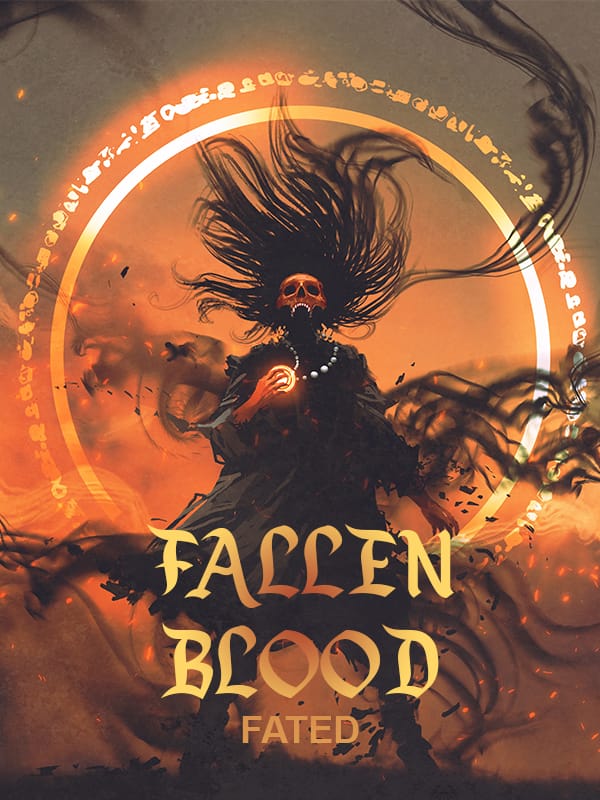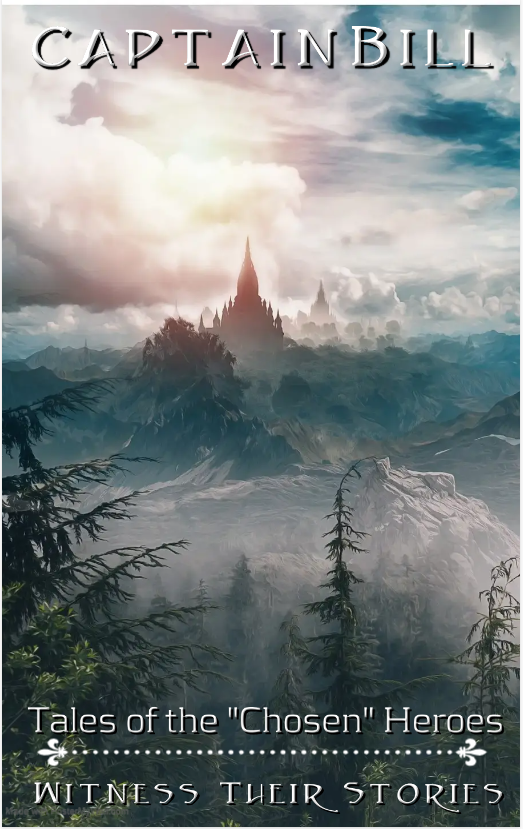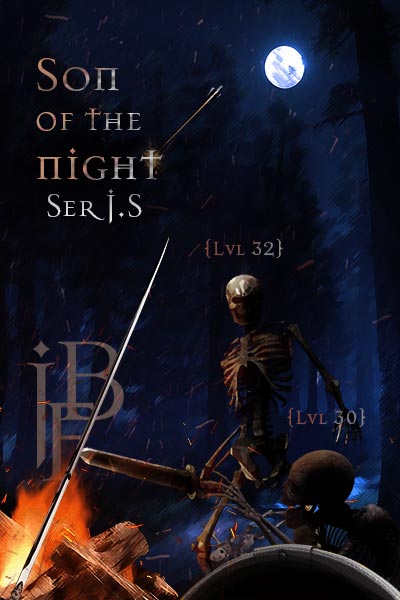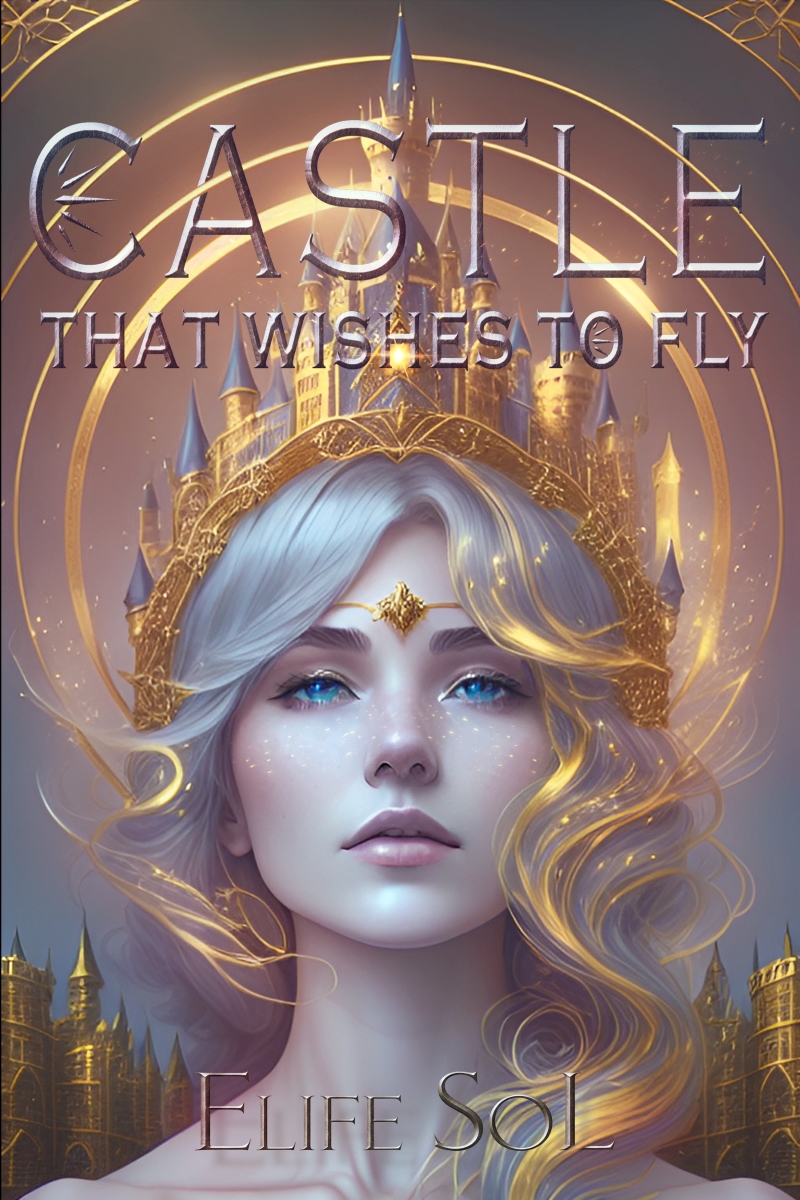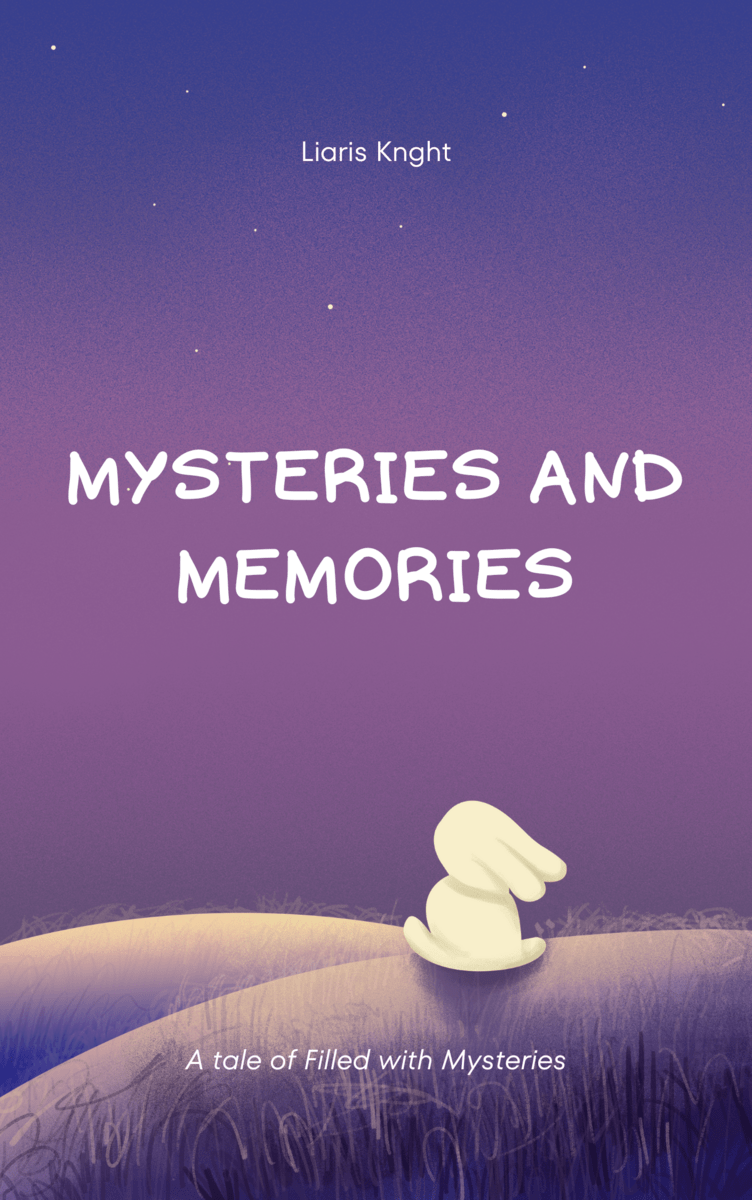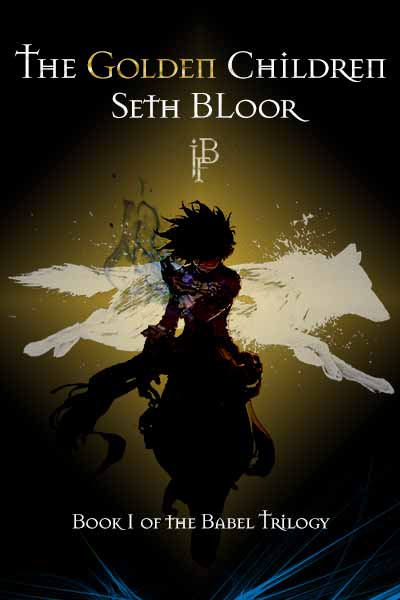It was a beautiful sight, something even the legends couldn’t describe — a radiant glow, white fur, and majestically blue eyes. History described the creature in mere paragraphs, as a rarity amongst rarities. Villagers from Basaraa knew of it from stories, an animal that combined the physical features of a stag and a bird.
“Another creature of mythology,” thought Gale. “If I’m not mistaken, this one should be able to use and understand human speech.”
As a greeting, the animal spread its wings and bowed, casting a shadow that resembled its form. It intrigued the boy, an interaction of uncertainty. But behind the mask of elegance, Gale sensed a difference, almost sinister in its nature.
“Are you a peryton, perhaps?” asked Gale, politely. “I should consider myself lucky; the forest has graced me a meeting with not one, but two creatures of myth.”
“The way you speak, it’s as if you know of us,” said the stag. “I see suspicion in your eyes, however; strange, especially for someone new to this world.”
“You hold an aura of neutrality, maybe indifference even; my eyes can tell,” revealed Gale. “But beyond that truth, I also sense something fragile, almost as if ready to break into hostility.”
“Uncommon knowledge, not something I expected of someone from this region,” the creature admitted, a little surprised. “May I ask what gave it away?”
Gale smiled, recalling a fragment of happiness from his past. He pictured hundreds of books, and his presence in a library, late into the night. His mother, and even the librarians would often observe him from a distance — lost in thought and in a world of his own. It was his fortress, a place of comfort and safety.
With the peryton in front of him, Gale stifled a laugh. For all his fascination, rarely did he imagine an opportunity for existence within a fantastical world. And here he stood, an embodiment of those dreams.
“I’ve heard that the secret lies in the shape of your shadows,” said Gale, matter-of-factly. “Perytons cast their own forms after having taken a life; is that accurate though?”
“Few know of this,” the peryton said with a bow. “But I seek no quarrel with a being of your strength and resolve. We might even be able to help you.”
“You know of why I’m here,” said Gale. “It is only appropriate for me to hear you out then.”
“We have observed small groups attempt to make contact or kill the Hearth King,” the creature revealed. “Unsuccessful, and for good reason. This one is different.”
“Different?” repeated Gale.
“In our experience, the kings of the past rarely possessed more intelligence than what was required to bend the wills of lesser goblins,” said the peryton. “The one that you seek, he’s blessed with divinity. I see resolve, perhaps as strong as yours; it is to conquer. He learns, trains his troops, and commands with focus.”
“A variance, then?” said Gale, pondering over the creature’s words. “I suppose you know of his whereabouts.”
“We do,” the peryton acknowledged. “But this information isn’t something we can offer for free.”
“I’ve been wandering quite aimlessly for a while now,” said Gale, sighing aloud. “Name your price; I might be able to figure something out.”
“It’s nothing too unreasonable,” the peryton said. “One of the two horns should suffice.”
Gale paused discussion. Compensation aside, the boy did desire one of the horns for the sake of experimentation.
“Elder Gram requires one as proof of assassination, and this trade with the peryton would leave me with none,” thought Gale. Aloud he said, “The terms would’ve been agreeable under normal circumstances, but stands a little disadvantageous given present situation. May I suggest something else?”
“Very well,” the peryton said with an affirmative nod.
“First, I would like to introduce myself,” the boy said. “My name is Gale Storm, a representative from the Kingdom of Suntaria. And you are?”
“I am Ogrion, an Elder Sage amongst the perytons of Basaraa Forest,” the creature said. “We are pleased to have made your acquaintance.”
“You negotiated trade, and also speak on behalf of your kind,” said Gale. “I imagine that you must be someone with a lot of influence. Given your status, I have a couple of conditions with regards to the horn, which I am happy to part with should you agree.”
“Do tell,” said Ogrion, showing signs of uneasiness.
“After the task’s completion, I would want full access to where you live, and any literature that you might be in possession of,” informed Gale. He folded his arms authoritatively, and added, “Also, it would be great if you could provide any information that I may require in the future with regards to the region itself.”
“You’ve tilted the trade in your favour,” said Ogrion. “I do not see any incentive for us to agree to these terms.”
“But there is,” said Gale. “In addition to the horn, I also pledge to answer your call during situations of danger. If I have an army by then, I will also move my soldiers to protect you. My desire is to acquire this world’s knowledge, everything relevant to my growth. This is mutually beneficial, in my opinion.”
“Would you also require protection in return?”
“I might ask for help should the need ever arise,” the boy admitted. “But you are not bound to answer my call; that will be your choice entirely.”
Ogrion lowered his head and peered into the boy’s eyes. In that moment, the peryton identified what only a few others had previously — an existence unencumbered by the influence of the world. But despite temptation to press further ahead, the creature stepped away, thoroughly satisfied with its examination of Gale.
“As a representative of the perytons of Basaraa Forest, I accept the terms,” said Ogrion, bowing in acknowledgement. “Let’s hope you succeed in your endeavour with the Hearth King.”
***
Ulric navigated through the silence of Booneswick Forest, with Rahu not far behind. He walked, distracted and deep in thought. Without the option for conversation, Rahu spent much of his time studying the unsettling terrain — a strange forest, bound to normalcy.
It was a humid environment, with moistened soil and long shadows, the same as any other forest under similar conditions. But there was a strangeness attached to it, a region devoid of any common sense. Without wind, the leaves rustled, and without life, the forest stirred. As Rahu’s ears adapted to the quiet, the sounds amplified — heartbeats at first, and then the lungs. His mind wavered, unable to tolerate the incessant churning of his own stomach, until it stopped — abruptly and without warning.
Rahu shook his head and focused once more; it dampened what existed in the realm of reality. He tried harder, reaching into the absence to identify what must have been a voice — a whisper.
“Don’t listen,” said Ulric, shaking his companion by the arm. “I chose to mumble for a reason.”
“What was that?” asked Rahu, rubbing his eyes. “That was maddening, to say the least.”
“I’ve studied this forest in the past, but the magic is old and unscripted,” said Ulric. “From what I can tell, the silence is designed to slowly weaken your mind, and the whispers push you toward insanity.”
“Who do the whispers belong to?” asked Rahu.
“No one,” said Ulric, with a smile on his face. “Apparently, the unceasing sounds of our insides are irritating enough for the mind to experience benign hallucinations. There’s nothing too malicious about this magic; it’s merely meant to deter people from being here for too long.”
“I can’t say that I’m amused,” admitted Rahu, shrugging as he did. “How far until our destination?”
“We should be there soon enough,” said Ulric. “Let’s hope we don’t run into too much trouble.”
In time, the foliage thinned, paving way to a network of stone-made paths and architectures. Ulric brushed his fingertips against the walls, curious about its composition. It emanated magic beyond comprehension, not unlike the spell of deterrence across Booneswick Forest. But there was more.
“Unattended, yet preserved without visible signs of degradation,” observed Ulric. “These structures are quite old; several thousand years, perhaps?”
Based on the trail of magic, Ulric followed the path with the highest aeter density. It thickened through progress, tightening around their bodies, and with suffocating effect. As a distraction, Ulric dove into his memories, recalling his investigation into Booneswick Forest.
“Decorative stone-made structures, arranged in a manner appealing to the eye,” remarked Ulric. “I believe this place was once called Gravestone Garden, Rahu.”
At a distance, towards the centre of the garden, Rahu noticed a tall structure — marvellous in its construct, and with a surface without blemish. It held the appearance of a castle in isolation, shrouded in mystery and uncertainty. There were statues as well, sculpted with diligent effort and a focus toward flawlessness. Without symmetry, the sculptures decorated the castle circumferentially, almost life-like in their postures — armoured, bearing shields and swords.
“This must be Gravestone Castle, then?” asked Rahu. “I’m slowly beginning to despise the aeter density here.”
“It should be fine inside the castle,” assured Ulric. “But there’s something different about the aeter here; the magic appears to be the same, and yet the governing laws are different.”
“What do you mean?”
“The magic cast across the garden is at least of the eighth tier, a spell for preservation,” explained Ulric. “There are some minor differences with the arrays at the castle, however. If I’m reading the aeter correctly, this should be a preservation spell for…”
Ulric paused, whispering through the rest of his explanation. He looked around, a frantic expression on his face, and stepped away from the sculptures. There was movement, hidden amidst the shadows at first, and then defyingly visible. They marched with discipline, motivated by nothing more than the sequence of commands that moved them.
“It’s life preservation; I believe they seek to repel or destroy us,” said Ulric, with a smile. “Circulus Magia: Cultivate Parasite.”
With the incantation, the ground moistened, hindering the progress of the sculptures. Just as it was in Argleton, the bacteria stirred, infesting the stone-made bodies, but with little effect. In retaliation, Gravestone’s guardians hastened march, echoing a stronger desire for victory. Momentarily weakened by the backlash of his spell, Ulric watched the sculpture, nearest to him, ready its blade for attack.
But despite the unfavourable odds, the sword never fell.
“Some things you’re good at, Ulric,” said Rahu, shattering the sword with his hammer. “But when it comes to breaking stones, you’re better off leaving such a task to me.”
“I suppose you’re right,” admitted Ulric, sighing aloud. “Would you like me to assist?”
“To be quite honest,” said Rahu. “I don’t think that’s necessary, really.”
In fluid motion, Rahu attacked the first sculpture to have initiated contact. His hammer struck with merciless ferocity, but faced resistance — sturdier than most shields, even.
“The preservation magic, it’s meant to protect against most forms of assault,” warned Ulric. “You’ll need to use your aeter.”
In retreat, Rahu watched his opponents fall into formation once more. He skittered to a halt, puffed his chest, and roared — thunderously loud, and aeter-amplified in strength. Gravestone’s guardians staggered and then weakened, almost as if deprived of their protective veil. Without a moment’s hesitation, Rahu attacked, swinging his hammer through without resistance this time. He watched the sculpture break into pieces, a smirk on his face, and moved through the rest.
The earth trembled against the Relictan Lord’s weight and weapon, now an unstoppable force. But as the effects of the roar waned, the sculptures retaliated. Rahu felt the veil grow ever stronger, wary and on guard. In what increasingly looked to be a losing battle, the Relictan began song for an incantation. He evaded blow after blow, gathering an incredible amount of aeter as he did. Brimming with energy, Rahu leapt into the air, the sun behind his back, and with his hammer in position.
“Circulus Magia: Mourning Hammer,” whispered Rahu, slamming his weapon against the ground.
From a distance, Ulric watched the overpressure sweep through the sculptures, clashing violently against Gravestone’s protective veil. His comrade struck again, and then repeatedly — in a sequence, summoning the howls and wailing of tortured souls. Merely sounds at first, the cries took incorporeal shape, eating away at the veil until none remained. Far from satiated, they turned their attention to the sculptures, now devoid of their protection.
“This should take care of it,” said Rahu, retreating to Ulric’s side. “It took more effort than I had anticipated.”
“I was expecting at least this much,” said Ulric, shrugging as he did. “Tell me something though; you managed to nullify the veil briefly the first time around, how did you do it?”
“It’s finally time for the great Ulric to ask me questions, is it?” said Rahu, with a laugh. “I made an approximation around the aeter frequency of the veil.”
“That’s genius,” praised Ulric, a childlike expression on his face. “You inversed frequencies to dampen the veil. But why didn’t you do it the second time as well?”
“The magic here is quite adaptive,” said Rahu. “After coming back up a second time, it constantly altered its aeter formula and frequency. I had to change tactics.”
As the conversation concluded, Ulric felt overcome with an odd sense of eagerness. His mind wandered into thoughts about the now unguarded Gravestone Castle and the treasures within. He looked toward Rahu, curious about the latter’s state of mind.
“Will you be accompanying me?” asked Ulric. “It would be great to have you in there.”
“You’re a great friend, Ulric,” said Rahu, laughing aloud. “But let’s not break promises.”
“Safe travels to you then, my friend,” said Ulric, admitting defeat. “Give your sister my regards.”


